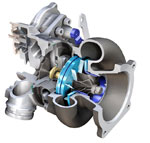 Most of the world’s major manufacturers are really into ‘downsizing’ their engines now to improve CO2 emissions and provide better torque. A new breed of 1.4 to 1.6 liter light turbocharged engines are replacing normally aspirated 2.0 liters, mainly in Europe.
Most of the world’s major manufacturers are really into ‘downsizing’ their engines now to improve CO2 emissions and provide better torque. A new breed of 1.4 to 1.6 liter light turbocharged engines are replacing normally aspirated 2.0 liters, mainly in Europe.Some statistics point to a fuel economy savings of up to 20% over normally normally aspirated rivals. Even our national carmaker Proton is looking into a Campro Turbo project, which basically allows our 1.6 liter block to make the power equivalent to a 2.0 liter or larger engine.
But a UK company called Warranty Direct claims that turbocharged cars are more likely to breakdown today compared to their normally aspirated rivals.
They also claim that half the cars built in Europe are turbocharged, and this number could rise up to 85% by the year 2020.

Of course, data such as this benefits companies like Warranty Direct, which sell extended warranty coverage which you can buy for your car when your manufacturer warranty expires. So there is a hidden motive in them delivering this message to the public. But if it is backed by data, it could warrant a little worry.
Companies like Toyota and Honda which have not followed this downsizing trend would be smiling at this piece of news as well. So far Japanese manufacturers haven’t really done much to develop such ‘downsized’ engines, except for Nissan which shares its new small turbo engine with Renault.
There really shouldn’t be nothing to worry about within the first 5 years or so of ownership if you really follow your service schedule. Owners of Golf GTI, Peugeot 308, MINI Cooper S, etc etc, any problems with your engine so far?


0 comments:
Post a Comment